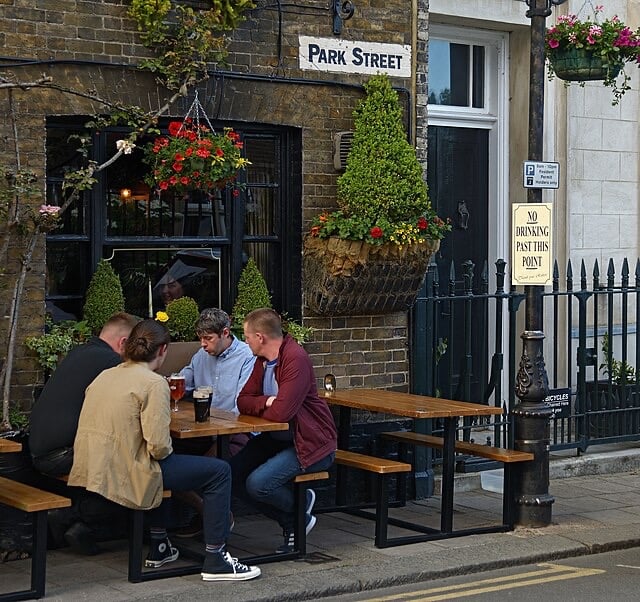Youngsters wanting to buy a pint at their local pub could soon be forced to produce a digital ID card under government plans to dramatically expand the controversial scheme beyond its original remit.
Whitehall officials have floated the idea of replacing traditional forms of age verification with digital identification linked to a centralised state database, sparking fury from privacy campaigners and opposition politicians.
The proposal represents a significant expansion of the digital ID programme, which ministers initially justified purely as a tool to combat illegal employment. However, the government now appears determined to embed the system across vast swathes of everyday life.
Civil liberties groups have raised the alarm that requiring digital ID for purchasing alcohol would enable authorities to build detailed profiles of citizens’ movements and drinking patterns through the centralised database.
Former Conservative cabinet minister Sir Gavin Williamson condemned the plans as evidence of Big Brother governance under Labour, warning the scheme’s reach is becoming increasingly invasive.
Every new detail that emerges reveals the government’s ambitions are growing ever larger, Sir Gavin said. Whether tracking pub visits, monitoring purchases or surveilling people’s movements, it’s deeply troubling.
The former education secretary questioned why the state needed any involvement in monitoring where law-abiding citizens choose to buy a drink, branding it intrusive and dangerous.
He dismissed claims the expanded scheme would tackle illegal working, arguing it simply represents greater state interference in people’s private lives.
Whilst young people already must verify their age when buying alcohol, the current system doesn’t involve any government-run digital database recording these transactions.
Conservative MP Greg Smith warned of a slippery slope between officials possessing data on where individuals use digital ID for age-restricted purchases and building comprehensive lifestyle profiles on citizens.
The Buckingham MP cautioned that ministers’ constant suggestions for new applications of digital ID could have sinister ramifications for fundamental freedoms.
The precise boundaries of the digital ID system remain vague. Ministers claim it’s necessary to prevent illegal working and have pledged to make digital ID mandatory for employment before the next general election.
However, they’ve already signalled far broader ambitions for the technology’s deployment across society.
Nearly three million people signed a petition opposing digital ID, but ministers brushed aside these concerns and vowed to implement the system by 2030.
The Department for Science, Innovation and Technology described digital ID as eventually becoming people’s boarding pass to government in its formal response to the petition.
Officials suggested the scheme could be required for accessing numerous public services, from claiming benefits to paying taxes, alongside age verification for alcohol and other restricted products.
The department argued that citizens currently must present various physical documents to prove identity or personal details when using services, starting jobs or purchasing alcohol, calling this bureaucratic and vulnerable to fraud.
Silkie Carlo, who heads civil liberties organisation Big Brother Watch, said the plans bore all the hallmarks of an expansive system requiring permits and digital licences for everyday activities.
Reform UK leader Nigel Farage declared he would accept imprisonment rather than obtain a digital ID card, warning the system could rapidly evolve into a tool for creating second-class citizens.
Speaking on GB News, Mr Farage suggested medical records and vaccination status could eventually be added to digital IDs, allowing the government to discriminate against those who don’t comply with official recommendations.
I absolutely will not have digital ID. Send me to prison if you must. I genuinely mean it, the Reform leader stated.
Ministers are confronting mounting opposition after the Daily Mail exposed plans to issue digital IDs to children as young as 13 years old.
A government spokesman defended the proposal, noting teenagers may require digital ID if they want Saturday jobs, given employment law permits part-time work from age 14, and in some council areas from 13.
Liberal Democrat technology spokeswoman Victoria Collins accused the government of mission creep, describing plans to enrol teenagers in a mandatory digital ID programme as frankly sinister and a clear example of state overreach.
Sir Keir Starmer discussed digital ID during an India visit this week, where a similar system already operates. The Prime Minister suggested the scheme might eventually be necessary for people to access their own money.
However, he conceded the government must work harder to convince a sceptical British public of the benefits.
Speaking in Mumbai, Sir Keir highlighted that India’s digital ID system has been adopted by roughly a billion people on a voluntary basis, enabling easier access to money and payments.
I think we now need to make the case for the huge benefits this will bring. There needs to be a national debate about it, the Prime Minister said.
Critics point out that India’s Aadhaar system, whilst widely adopted, has faced significant controversies over data breaches, privacy violations and concerns about state surveillance capabilities.
The British government’s digital ID proposals have drawn comparisons to China’s social credit system, though ministers insist safeguards will prevent such dystopian applications.
Privacy advocates argue that once infrastructure for mass surveillance exists, mission creep becomes inevitable regardless of initial assurances from politicians.
The debate over digital ID represents a fundamental clash between government claims of modernisation and efficiency versus citizens’ rights to privacy and freedom from state monitoring.
Follow for more updates on Britannia DailyRetry
Image Credit:
The Two Brewers, Windsor — photo by Norman Griffin, licensed under CC BY-SA 2.0



